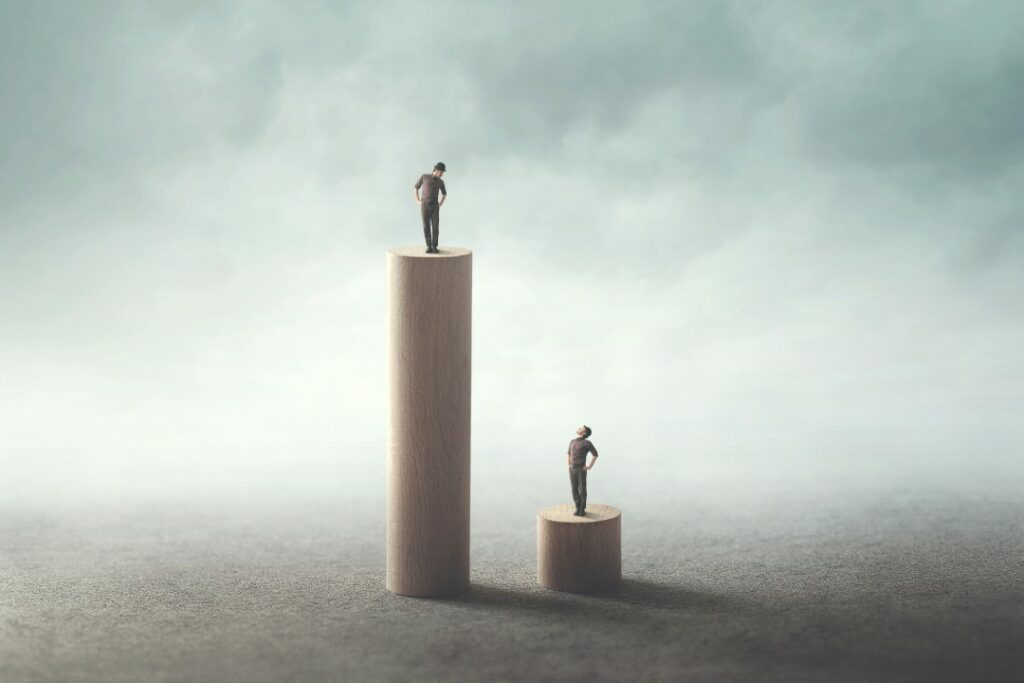How often do you or those around you recognize that a problem exists but come up with any number of excuses to avoid fixing it? This sort of kicking the can down the road is a hallmark of the second stage of the evolution of an obvious, high-probability gray rhino crisis: muddling.
(Read this recent article for more on the five stages, which are detailed in depth in my 2016 book, THE GRAY RHINO: How to Recognize and Act on the Obvious Dangers We Ignore.)
Inequality is a prime example of muddling. Yes, people are aware of the problem. The French economist Thomas Piketty’s 2013 book, Capital in the Twenty-First Century, was a best seller. A google search brings up 101,000,000 results. And many gallons of ink (er, pixels) have been spilled on how the problem of income and wealth economy creates a drag on the global economy, feeds populism and political instability, and prolongs the kinds of poverty and injustice that make liberals squeamish.
Oxfam’s annual report on inequality, released at the Annual Meeting of the World Economic Forum at Davos reminds us regularly how shockingly entrenched inequality is. “Governments are massively under-taxing the wealthiest individuals and corporations and failing to collect revenues that could help lift the responsibility of care from women and tackle poverty and inequality,” Oxfam noted this year.
But what gets done about it? The world’s 500 richest people got $1.2 trillion richer in 2019, adding a startling 25 percent to their wealth. To be sure, the market volatility unleashed by the pandemic has likely erased that for anyone who did not bet on a financial and economic crash.
Ending the muddling stage requires a critical mass of people who feel a sense of urgency and the confidence that it’s worth the effort to make change happen. In an ideal world, that comes from a powerful sense of human agency and commitment to doing the right thing before a crisis happens. In reality, it often happens because a catastrophe makes it impossible to avoid the problem.
Can the COVID-19 pandemic and its cascading economic destruction be that catalyst?
Inequality has become a major public health issue that affects everyone, including our ability to save lives and to control the economic damage caused by the coronavirus.
“The spread of the coronavirus has also highlighted the divide between workers who receive paid sick leave and vacation days, and low-wage workers who don’t get paid if they have to take time off for illness,” Alana Samuels wrote in Time. Public-facing service industry workers are hit particularly hard: retail salespeople, waiters, teachers and tutors, caretakers, hotel clerks, landscapers, cleaning staff, public transportation drivers, postal workers, entertainment attendants… the list goes on and on.
Just as the 1918 flu pandemic regressively punished the poor, so will today’s novel coronavirus pandemic. “Like 102 years ago, this wave of the pandemic will almost certainly disproportionately punish the poor—not only by arresting the long recovery since the Great Recession, but also by specifically targeting industries where workers are most vulnerable and have the least protection,” Derek Thompson wrote in The Atlantic.
While the impact is catastrophic for the poorest, nobody will go untouched. And it’s past time for business and property owners –and above all, the very richest in society—to recognize that they are far from insulated from the struggles of those who are most vulnerable in this crisis.
Landlords are finding their tenants can no longer pay rent. Creditors are finding that companies that owe them money have trouble paying when they can’t open their doors for business. As slaughterhouse workers fall ill, grocery stores are finding it harder to get meat. Dairy farmers unable to get their products to market are having to pour milk out on the ground.
Addressing inequality is not just a matter of lessening damages: it also has clear payoffs in better times. “We know that more equal societies are more cohesive and productive and less violent and anxious,” Alexandre Kalache, President, International Longevity Centre-Brazil, wrote for the World Economic Forum. “Reducing inequality is not an assault on the market but a defence of it. The COVID-19 crisis adds a note of drama and urgency to the need of such actions.”
The mindset shift we need is to stop focusing on all the reasons we “can’t” solve a problem, and instead to ask “What does it take to solve inequality, and what can each of us do to make that happen?” This is how we move from the tedious muddling/kick-the-can stage to the active, problem-solving diagnosing mode. Stay tuned for more on that.
We can no longer resort to tired reasons why we cannot address inequality, but rather need to recognize that we can no longer afford NOT to confront this huge gray rhino.
This article is part of my LinkedIn newsletter series, “Around My Mind” – a regular walk through the ideas, events, people, and places that kick my synapses into action, sparking sometimes surprising or counter-intuitive connections.
To subscribe to “Around My Mind” and get notifications of new posts, click the blue button on the top right hand on this page. Please don’t be shy about sharing, leaving comments or dropping me a private note with your own reactions.
- The Gray Rhino Wrangler on Substack - January 1, 2025
- Gray Rhino Risks and Responses to Watch in 2024 - January 10, 2024
- In the Media 2023 - December 31, 2023


